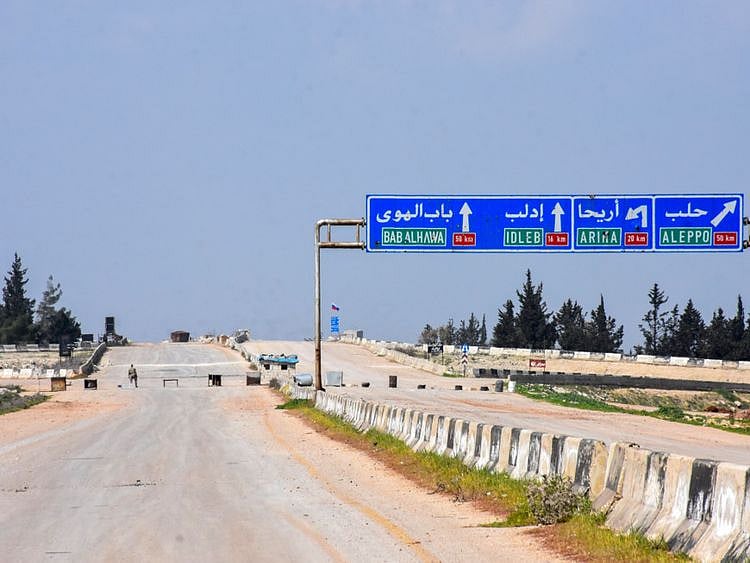Erdogan loses ground under new Idlib agreement
Whether the latest Syrian agreement stands or fails depends on Russia and Turkey

Developments in the Syrian north have been completely overshadowed by the domino shutdown of Arab countries over Covid-19. As the world looked elsewhere, Russia and Turkey inked a crucial agreement on March 5, ending violence in the northwestern city of Idlib.
Vladimir Putin and Recep Tayyip Erdogan had been at daggers-end over Idlib, with each president claiming that the other had strayed from an earlier agreement, reached at the Black Sea resort of Sochi back in September 2018. That deal called on the Turks to cleanse Idlib from Hayat Tahrir Al Sham (HTS), the Al Qaida branch in Syria, by no latter than mid-October 2018. Erdogan missed the deadline, and all its extensions, prompting Putin to claim that Turkey was not serious about its promises in Idlib. If Erdogan wasn’t going to do the job, he added, then the Russian and Syrian armies would take matters into their own hands.
Swiftly, they rumbled through the Idlib countryside, overrunning strategic cities like Saraqib and Marret Al Nouman. They fired at will, striking at all members of the armed opposition, including at those on Turkish payroll. Erdogan quickly sent reinforcements to his Syrian proxies, claiming that the attack on Idlib was a violation of Sochi 2018. He was particularly worried about the 25 Turkish checkpoints scattered across the province, which had come under Russian and Syrian fire after the killing of 33 Turkish soldiers in Syria. Putin gently reminded him that Sochi had allowed him to set up 12 checkpoints in Idlib, not 25, adding that the current number was already a violation of Sochi. In the talks that took place on March 5, Erdogan tried to bargain for an increase — up to 50 checkpoints in Idlib, but that was flatly rejected by Putin.
Joint Russian-Turkish control
Meanwhile, the Russian President insisted that the aim of the operation was only to retake the M4 and M5 highways, while squeezing the armed opposition from the Idlib countryside. They had no intention of taking on Idlib City — an argument that Erdogan seemingly did not believe. The two presidents finally agreed that the Idlib operation would come to a halt and the M4 would come under joint Russian-Turkish control while the M5 would remain with the Syrian and Russian armies. So would all the Syrian towns that they had recently been retaken in the Idlib countryside, thus shrinking Turkey’s zone of influence in the Syrian northwest. Meaning, Khan Shaikhoun, Maaret Al Nouman and Saraqib are territorial gains for Syria and Russia that have now become permanent and silently accepted by the Turkish President as a fait accompli.
In exchange for Erdogan’s lenience, Putin met him at midway on the M4, agreeing to temporary co-share the motorway with Turkey. In addition to the joint patrols, a safe corridor will run through it, 12km in length. The new agreement returns the ball to Turkey’s court concerning HTS. Erdogan has been tasked, yet again, with cleansing the area from terrorist fighters, although he has not been given a deadline to accomplish that.
Before his meeting with Putin, Erdogan had outlined a long list of ambitious demands, which were all rejected by the Russians. In addition to raising the number of checkpoints, he wanted a no-fly zone in Idlib, where only Turkish drones could operate, along with a joint mechanism to monitor violations, possibly through a UN resolution. Putin said no, insisting that Idlib should remain a Russian-Turkish file only, with no internationalisation. Erdogan started to climb down the ladder, making one painful concession after another, until all he was left with was a mandate to clean Idlib, and joint control of the M4.
Erdogan left with less ammunition
The new agreement leaves Erdogan with less ammunition than what he had when the crisis started earlier this year. He had been using the refugee card to pressure EU into backing his territorial ambitions in Idlib, threatening to send them to the shores of Europe. That has now come to an end, and so has the violence in Idlib — albeit temporarily. What the new agreement did not achieve was revival of the Adana Agreement, which Putin had conditioned before meeting Erdogan. This is something that the Russian leader had pushed for since February 2019, hoping that it would lead to the normalisation of ties between Damascus and Ankara. All he has gotten in this regard is lip service from Erdogan, with no action.
Many are wondering whether the new Idlib agreement is sustainable. For the next eight months at least, the United States is too busy to mind the nitty-gritty details of the Syrian battlefield, thanks to presidential elections. So is the international community that is preoccupied with Covid-19. That is a blessing in disguise for the presidents of Turkey and Russia. Erdogan and Putin are now on their own in Idlib, free to tear each other apart or work inharmony on co-share influence the war-torn city. Whether the new agreement stands or fails depends on how confidence building measures play out between the two leaders, and what kind of under-the-table deals come later — two constants in the new ten-year old Syrian conflict.
—Sami Moubayed is a Syrian historian and visiting scholar at the Carnegie Middle East Centre in Beirut.
Sign up for the Daily Briefing
Get the latest news and updates straight to your inbox
Network Links
GN StoreDownload our app
© Al Nisr Publishing LLC 2026. All rights reserved.